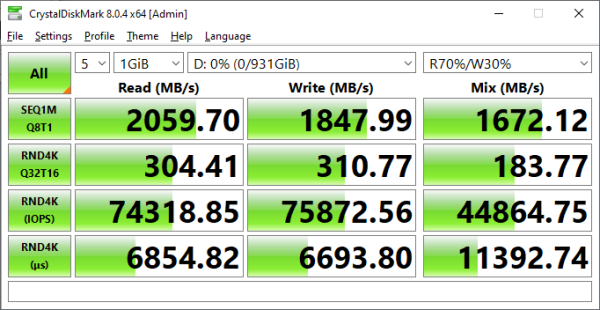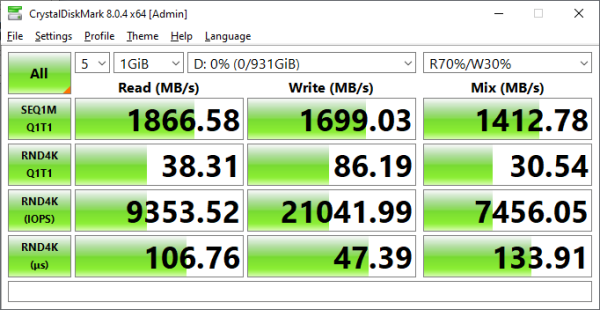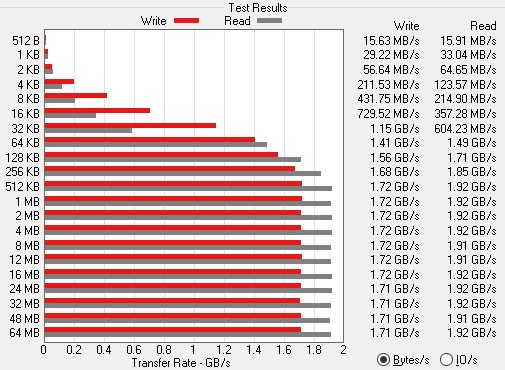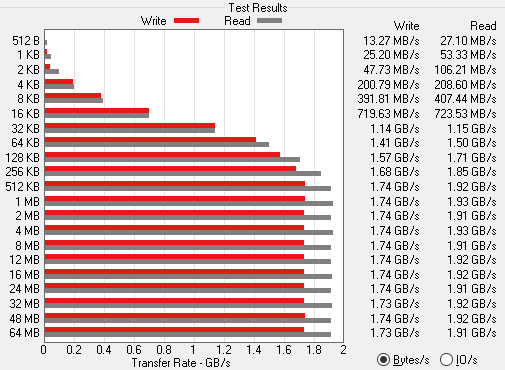The test system used in this review is equipped with an AMD Ryzen 5 3700x CPU, MSI B550 GAMING PLUS motherboard, 16GB (8GB x 2) of Crucial Ballistix 3200 MHz DDR4 memory, Crucial P5 1TB SSD, GIGABYTE GeForce GTX 1060 WINDFORCE OC 6G graphics card and an ORICO PE20-1C USB 3.2 Gen 2×2 PCIe expansion card. For the operating system, I used the latest version of Windows 10 Pro.
To test the performance of ADATA's Elite SE880 SSD, I ran a series of benchmarks using CrystalDiskMark, HD Tach RW, ATTO Disk Benchmark, AS SSD, HD Tune Pro, Anvil's Storage Utilities, Iometer and PCMark 8. For comparison, I've also included test results from the Kingston XS2000, Crucial X8, Lexar NQ100, Samsung 870 EVO, Samsung 870 QVO, SK hynix Gold S31, ADATA Ultimate SU750, Samsung 860 QVO, Samsung 860 PRO, Crucial MX500, Plextor M8V, Crucial BX300, ADATA Ultimate SU900, Plextor S3C, Toshiba OCZ VX500, ADATA Ultimate SU800, Plextor S2C, Crucial MX300, Plextor M7V, PNY CS1311, OCZ Trion 150, PNY CS2211, Plextor M6V, Crucial BX200, OCZ Trion 100, Kingston HyperX Savage, Crucial MX200, OCZ Vector 180, Kingston BX100, Samsung 850 EVO M.2, Samsung 850 EVO mSATA, AMD Radeon R7, Silicon Power Slim S80, Samsung SSD 850 EVO, OCZ ARC 100, SanDisk Ultra II, Crucial MX100, SanDisk Extreme Pro and Samsung SSD 850 PRO.

As I mentioned earlier, the Elite SE880 is based on Silicon Motion's SM2320 controller chip. Looking at the screenshot above, you can see that it performs equally well with both incompressible (0%) and compressible (100%) data.
CrystalDiskMark 8.0.4:
First, I ran a few quick tests using CrystalDiskMark. This benchmark measures the performance of a storage device by testing its sequential and random read and write speeds. For this test, we're using the peak and real world profiles.

According to ADATA, the Elite SE880 is capable of reading and writing at speeds up to 2,000 MB/s when plugged into a USB 3.2 Gen 2x2 port. While the drive had no problems reaching its rated read speed, it came up a bit short in CrystalDiskMark's sequential write speed test.

As you'd expect, the Elite SE880 wasn't quite as fast when tested with the "real world" profile, which uses a single thread and a much lower queue depth. Nevertheless, it was still able to read at 1,866 MB/s and write at more than 1,699 MB/s.
HD Tach RW 3.0.4.0:
Next, I used HD Tach to test the ADATA Elite SE880's read, write and burst speeds as well as its seek times and CPU usage.

Looking at the screenshot above, you can see that the Elite SE880 had average read and write speeds of 826.6 MB/s and 463.2 MB/s respectively, as well as a burst speed of 531.5 MB/s.
ATTO Disk Benchmark 4.01:
I also used ATTO Disk Benchmark to test the Elite SE880's sequential read and write speeds. The tests are run using blocks ranging in size from 512B to 64 MB and the total length set to 256MB.
When tested with ATTO, the Elite SE880's read speeds topped out at about 1.92 GB/s and its write speeds at 1.72 GB/s.



